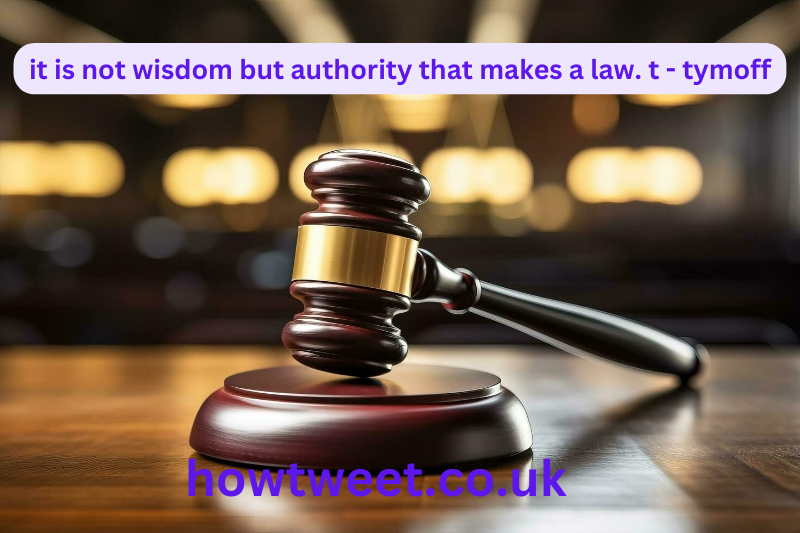The statement, “It is Not Wisdom But Authority That Makes a Law. T- Tymoff” attributed to T. Tymoff, raises important questions about the nature of laws and the source of their legitimacy. This quote invites us to contemplate whether laws are primarily established based on wisdom, which implies a rational and just foundation, or if they are imposed through authority, which suggests a hierarchical or coercive process. Let’s delve into the implications of this statement and its relevance in discussions about law and governance.
Introduction
In the timeless words of T-Tymoff, “It is not wisdom but authority that makes a law.” This phrase encapsulates the complex relationship between the wisdom behind laws and the authority that enforces them. This article delves into this statement, exploring its implications, historical contexts, philosophical perspectives, and its relevance in modern lawmaking.
Understanding the Statement
Defining Wisdom in Law
Wisdom in law refers to the ability to make prudent decisions that consider the broader implications on society. It involves foresight, ethical judgment, and an understanding of human nature.

Authority in Lawmaking
Authority is the legitimate power to enforce obedience and make decisions. It is the foundation upon which laws are created and implemented.
Authority and Law Enforcement: It is Not Wisdom But Authority That Makes a Law. T- Tymoff On the other hand, the role of authority in making and enforcing laws cannot be ignored. Laws are established by governments and legislatures, and they possess the authority to enforce these laws through law enforcement agencies. Authority ensures that laws are adhered to and that consequences are imposed on those who violate them. This is essential for maintaining order and preventing chaos in society.
However, the quote byIt is Not Wisdom But Authority That Makes a Law. T- Tymoff
The Interplay Between Wisdom and Authority
The quote “it is not wisdom but authority that makes a law. t – tymoff” emphasizes the fundamental role of authority in the process of lawmaking. While wisdom can inform the formulation of laws through ethical principles and societal values, it is ultimately the authority vested in legislative bodies that imparts legal validity to these enactments. This dynamic highlights the necessity of authoritative power in creating laws that are enforceable and binding.
“It is not wisdom but authority that makes a law. t – tymoff” suggests that without authority, laws would lack the necessary force to be effective. Authority provides the mechanism through which laws are enacted and upheld. This mechanism involves the power of government institutions, such as parliaments and congresses, which have the legal mandate to create laws. These bodies draw upon wisdom to shape legislation, but it is their authoritative power that brings these laws into existence.
Furthermore, “it is not wisdom but authority that makes a law. t – tymoff” points to the role of authority in maintaining order and stability within society. Laws serve as guidelines for behavior, and without the authoritative power to enforce them, they would be ineffective. This enforcement ensures compliance and deters individuals from engaging in unlawful activities. For instance, traffic laws are created based on wisdom regarding safety, but it is the authority of the police that enforces these laws and ensures adherence.

The Role of Authority in Lawmaking |it is not wisdom but authority that makes a law. t – tymoff”
The quote “it is not wisdom but authority that makes a law. t – tymoff” asserts the pivotal role of authority in the legal system. Authority is the legitimate power vested in entities like legislative bodies, law enforcement agencies, and the judiciary to create, enforce, and interpret laws. This power ensures that citizens adhere to the established legal framework, maintaining order and stability within society.
In democratic systems, authority is typically granted through a process of representation, where elected officials are empowered to make laws on behalf of the people. This delegation of authority is essential for the functioning of large, complex societies where direct participation in every decision is impractical. However, “it is not wisdom but authority that makes a law. t – tymoff” suggests that the mere possession of authority does not guarantee the wisdom or justice of the laws created. The effectiveness and fairness of legal systems depend on how this authority is exercised and checked.
Authority as a Means of Enforcement
“It is not wisdom but authority that makes a law. t – tymoff” underscores the necessity of authority in the enforcement of laws. Without the power to enforce, laws would be mere suggestions without practical impact. Authority equips enforcement agencies with the means to ensure that laws are followed, thereby maintaining societal order and stability.
Enforcement mechanisms include a range of activities such as patrolling, investigating, and prosecuting violations. The presence of law enforcement officers serves as a deterrent to unlawful behavior, as individuals are aware of the consequences of breaking the law. This deterrent effect is a crucial aspect of maintaining compliance and ensuring the effectiveness of legal norms.

The Ethical Imperatives of Legal Authority
The quote “it is not wisdom but authority that makes a law. t – tymoff” emphasizes the significant role of authority in lawmaking. However, it also highlights the need for ethical considerations to balance the exercise of power. The interplay between power and justice is crucial for creating a fair and equitable legal system. Authority provides the mechanism for governance and order, but without wisdom to temper this power, laws can become tools of oppression rather than instruments of justice.
Balancing power and justice involves ensuring that laws serve the common good and protect individual rights. “It is not wisdom but authority that makes a law. t – tymoff” suggests that while authority is necessary for the enforcement of laws, it must be guided by ethical principles to ensure fairness. For example, laws that disproportionately affect marginalized communities or infringe on basic human rights reflect a misuse of authority. Ethical governance requires that laws are crafted with an understanding of justice, equity, and respect for individual dignity.
Accountability and Transparency
The quote “it is not wisdom but authority that makes a law. t – tymoff” also highlights the importance of accountability and transparency in the exercise of legal authority. Authority, when exercised without oversight, can lead to corruption and abuse of power. To prevent this, it is crucial that the exercise of authority is transparent and subject to scrutiny. Accountability mechanisms ensure that those in positions of power are held responsible for their actions and that their decisions are subject to review.
Transparency in the legislative process involves open and accessible decision-making, where the rationale behind laws and policies is clearly communicated to the public. “It is not wisdom but authority that makes a law. t – tymoff” suggests that transparency helps build trust in the legal system and ensures that laws are seen as legitimate and fair. For example, public consultations and debates on proposed laws provide opportunities for citizens to participate in the legislative process, contributing their perspectives and ensuring that laws reflect the collective wisdom of society.

The Dangers of Disregarding Wisdom
The quote “it is not wisdom but authority that makes a law. t – tymoff” emphasizes the critical role of authority in the enactment of laws. However, this perspective also highlights the potential dangers of sidelining wisdom in the legislative process. Ignoring wisdom can lead to laws that lack moral grounding, social relevance, and long-term viability. Without the guiding principles of wisdom, laws may become instruments of control rather than mechanisms of justice and fairness.
Modern Legislative Challenges
The quote “it is not wisdom but authority that makes a law. t – tymoff” highlights the necessity of authority in lawmaking. However, modern legislative challenges require a nuanced approach that integrates both authority and wisdom. Today’s societies face complex, interdependent issues that cannot be addressed by authority alone. Balancing economic, environmental, and social priorities is essential for effective legislation. This balance ensures that laws not only maintain order but also promote the well-being of the population.
Conclusion
The quote “it is not wisdom but authority that makes a law. t – tymoff” offers a profound insight into the nature of legal systems. Throughout this exploration, we have delved into various aspects that define the delicate balance between wisdom and authority in lawmaking. This balance is crucial for creating just and effective legal frameworks that can address complex societal issues while maintaining order and compliance.By integrating wisdom into the exercise of authority, societies can create legal systems that are effective, just, and responsive to the needs of their citizens. This balanced approach is essential for promoting justice, equity, and the rule of law in a complex and dynamic world.
